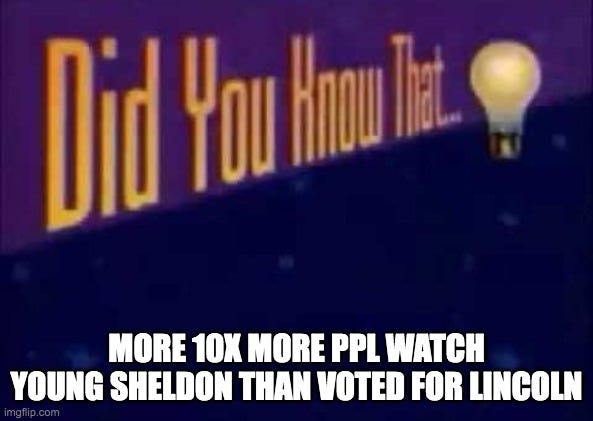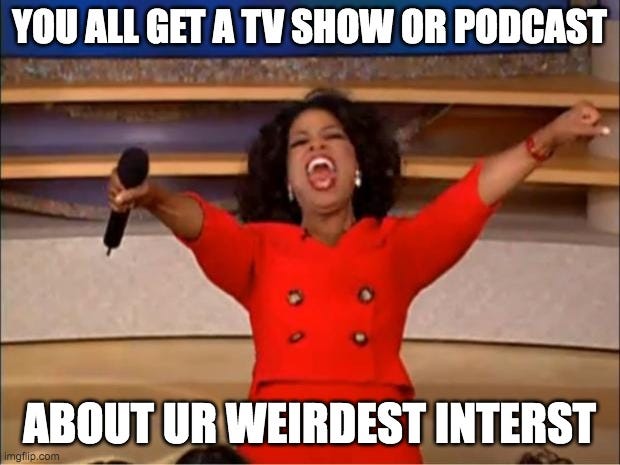Let’s redefine pop culture for 2022 cuz Google is dumb.
Opening Remarks
Let’s start with two stats:
In 1860, Abraham Lincoln received 1,865,908 votes from the American public to defeat Kentucky’s John C. Breckinridge in the presidential election.
In 2022, CBC has 20 shows averaging more that 2.2 million per episode (including FBI: International, FBI: Most Wanted, FBI, and three different NCIS’s).
What does this mean?
Pop Culture (participating in Presidential elections) used to be really small.
Niche interests (being really into cable-based crime shows) are now really big.
Ok, so what does that mean?
It means that Google defines pop culture incorrectly.
If you do the Google search, as referenced last blog, pop culture is defined as follows:
Popular culture is the set of practices, beliefs, and objects that embody the most broadly shared meanings of a social system
The premise is that if something is big and famous and well known, then it is pop culture. By this definition, pop culture is anything consumed at scale: TikTok, CNN, Sports, McDonalds, Ed Sheeran, etc.
This might have been a decent way to describe pop culture in the late 90’s and early 2000s, when a user’s content diet was contained within the tried and true physical network of word of mouth, newspapers, magazines, or a burgeoning digital playground being created via MP3 players, cable television, and a barely usable internet.
In 2022, the game has changed. Content, ideas, opinions are no longer confined to phyiscal networks or constrained by nascent technology. Instead, opinions are amplified across a diverse and growing subset of platforms created in the last twenty years: mobile phones, streaming services, social media, apps, etc.
THESIS TIME
The power structure between individuals and platforms has been turned on its head, which has lead a fragmented instantiation of pop culture.
Before the early 00s, pop culture was driven by mass media. What was on TV, what was written in newspapers, and what you heard on the street drove a ton of interests, as pop culture participants were locked into those networks. (ex: if you hated what was on cable, you sort of just had to deal with it.)
In 2022, pop culture is almost running opposite of mass media. There is no vendor lock-in anymore, as users can choose to live within their own echo chambers. Content on TV and the internet is unlimited, allowing users an unprecedented ability to consume only what they like.
This means that someone who really likes Taylor Swift can LITERALLY only listen to Taylor Swift. Or, for example, members of political parties have the option to only follow members of their own political party.
To extrapolate, modern pop culture is all about sub interests, which has led to really weird things like ASMR, nerd culture, K-Pop fandom, and the ability to literally find and connect with a group on ANY topic via meetup.com (this last point is super important, as the internet has let ppl realize that their weird interests aren’t that weird because, well, other people are on the internet consuming the same content).
A Bit More Explaining
If you follow this logic, pop culture is no longer about the mass consumption and knowledge of a certain idea or piece of content — pop culture is about really niche interests of millions of users. It is pop culture is really just subcultures (weird interests of ppl) becoming big enough to be noticed by the mass media people who used to control what was actually pop culture.
For example, ASMR was a sub culture until 60 minutes did a documentary of it in 2017, at which point it died because it was no longer cool. In 1992, 60 Minutes highlighting ASMR would've made ASMR firmly part of our pop culture. However, in 2022, 60 Minutes doing an ASMR documentary surely means that the ASMR fad is over and no longer part of pop culture.
To put it another way, pop culture is no longer about monoliths (single great interests shared by communities). Instead, pop culture is now a varied polylith powered by GenZ memes, the millennial urge to fit in on social media, and the boomer’s love for creating echo chambers of political opinions on Facebook — and these things change quickly, as the internet feedback loop never sleeps.
Pop culture then, is now more about passionate individuals creating subcultures and growing and growing and growing them until they hit the ~mainstream~. Where, at that point, the subculture briefly becomes pop culture, until it becomes cringe and mainstream, at which point it dies on the stake.
Here’s a chart to show the lifecylce of pop culture based on the above definition:
It’s Defining Time (sing this in your head to Semisonic’s “Closing Time” as this is also the conclusion)
So I guess I need to define pop culture.
For reference (again), Google says pop culture is: “the set of practices, beliefs, and objects that embody the most broadly shared meanings of a social system”
I think my definition will be thus:
Pop culture is what the most passionate people on the internet are passionate about at exactly this second.
I rest my case.
- Kram







